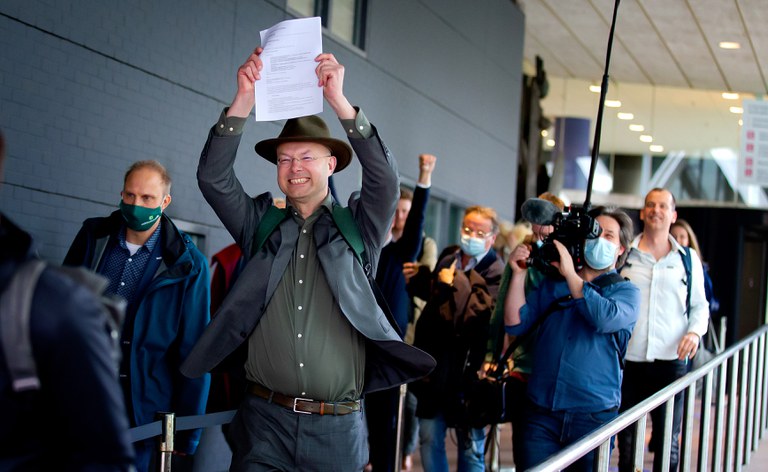What they feared so much at Shell's headquarters in The Hague, became reality on Wednesday 26 May. We won our Climate Case against Shell. We have listed the most important points from the verdict for you.
Shell must reduce its emissions by 45% by 2030, compared to 2019.
This means that if Shell wants to continue to operate as an energy company, it must do its utmost to offer greener alternatives to both suppliers and consumers.
Shell CEO Ben van Beurden has stated: ‘I will pump up everything I can to meet consumer demand’. We have argued that Shell has an enormous influence on consumer demand. This is because consumers aren’t necessarily demanding oil or gas, but simply a way to get from a to b. The court has ruled in our favour. So Shell must use its influence to offer consumers more sustainable choices. Shell can no longer simply be a follower; it must lead the way.
We brought this case on behalf of 6 co-plaintiff organisations and some 17,000 co-plaintiffs. The court, however, ruled that the ActionAid and 17,000 co-plaintiffs were inadmissible. The court argued that individual co-claimants can only be admissible if their interests go unrepresented. Since the interests of the individual co-claimants were represented by the 5 [6?] admissible organisations, the individual co-claimants themselves were declared inadmissible. That does not alter the fact that the co-plaintiffs remain very important to us. It is in part because of them that we were able to pursue this case. Nevertheless, it really doesn’t matter because the consequences of the court’s ruling produce the same crucial benefits for those 17,000 co-plaintiffs (not to mention the rest of the world’s population). We are still discussing whether we will appeal this decision.

During the hearings in December 2020, we argued before the court that Shell is violating basic human rights. For example, the right to life and a secure family life. The court agreed with us. Because Shell is a major cause of catastrophic climate change, it puts people’s lives at risk. And this cannot be easily undone.
Shell argued in court that it is primarily a task of the government to draft rules and regulations that must prevent further climate change. Shell expressed a willingness to comply with these regulations. But the court ruled that Shell must accept its own responsibility and that it is about time that Shell assumed this responsibility.
The whole world must start reducing CO2. Shell is no exception here. This is especially true of a company like Shell because it has an enormous capacity to reduce those CO2 emissions.
In court, Shell continued to claim that if it were to withdraw from Nigeria, for example, other companies would simply leap in to replace it and thus its departure would have no effect on CO2 emissions. The court disagreed and stated that other companies have the same obligations that Shell has. So, they are also responsible for reducing their CO2 emissions.

Shell must change course and make the necessary sacrifices in the process. The court ruled that the future of the planet outweighs any setbacks that Shell may experience as a result of this verdict.
The court ruled that Shell must start reducing its CO2 emissions immediately. This means that Shell cannot simply wait for the outcome of an appeal. This is good news because 2030 is fast approaching. Therefore, any appeal process must not be allowed to have a delaying effect; Shell must begin by taking action NOW. By depending on an appeal to do nothing in the meantime, Shell is also taking a huge risk; if it loses an appeal, it will have even less time to comply with the verdict.
Shell’s current climate policy is not concrete enough and is full of caveats. It is based on following current societal trends. This is totally insufficient. That is why the court ruled that there were imminent violations of human rights in its current policy. Which means that it is all the more imperative that Shell with the verdict – immediately.
Our website uses cookies to ensure the use and functionality of this website. Read more about our cookie policy